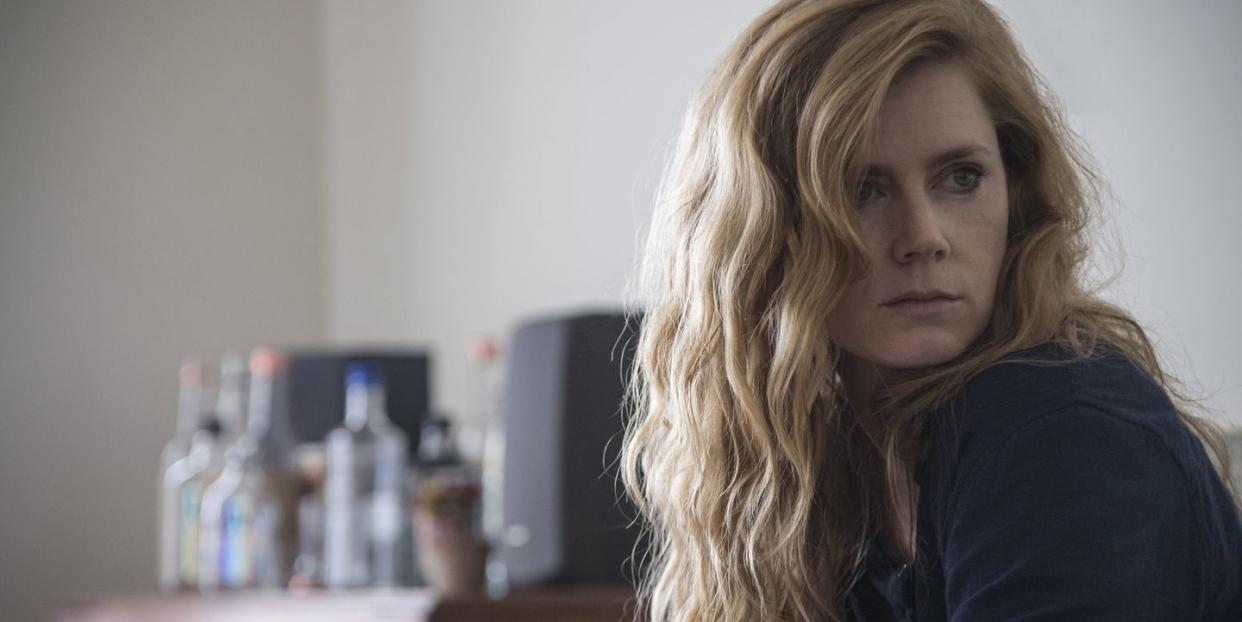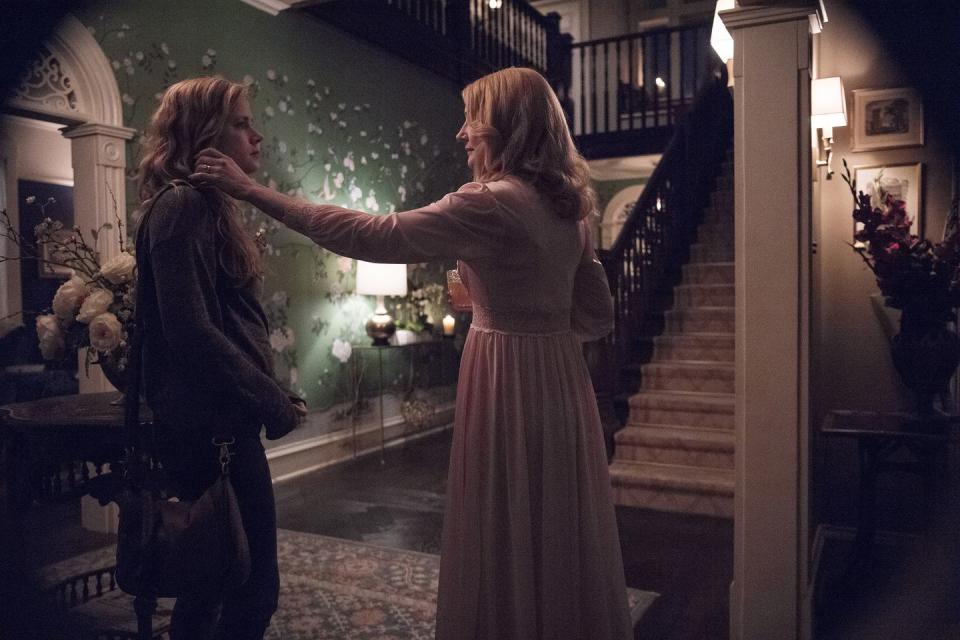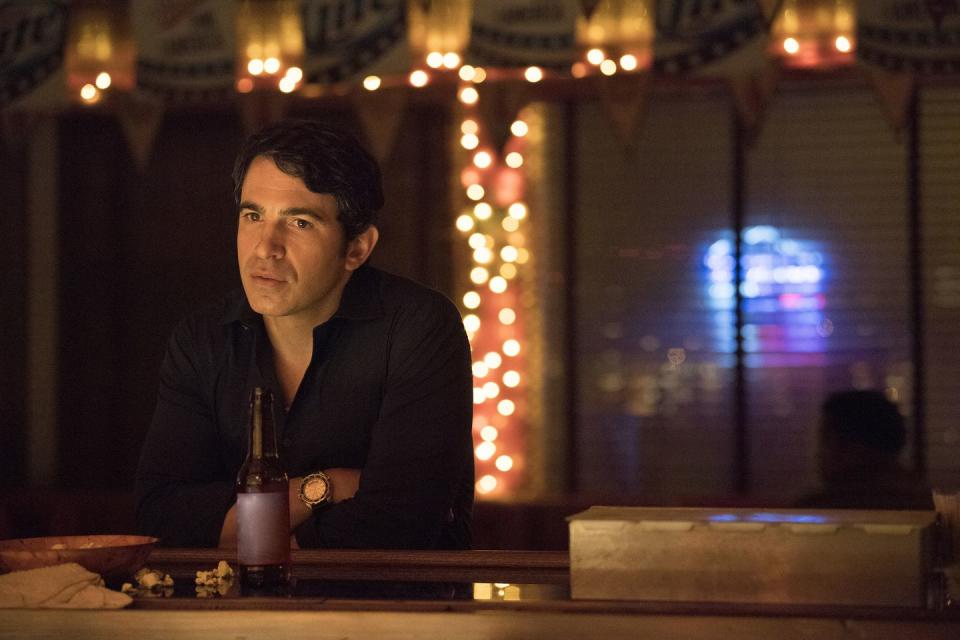Sharp Objects Episode 1: Home Is Where the Horror Is

Going back to your childhood home as an adult is always fraught. No matter how close your family or how idyllic your upbringing, reconciling the then and now can be disorienting, and director Jean-Marc Vallee spotlights that uneasiness in his beautifully raw adaptation of Gillian Flynn’s debut novel Sharp Objects. Through Vallee’s editing and Marti Noxon’s sharp script, memories of the past blend seamlessly into the physical reality of the present, creating a slippery mental landscape for Camille Preaker (Amy Adams), a troubled journalist who’s sent to her small Missouri hometown to investigate a possible serial killer targeting young girls.
Even before her editor asks her to return home to Wind Gap, Camille is clearly haunted by the place. The first episode’s sumptuously unsettling opening follows a young Camille and her little sister Marian, who is later revealed to have died in childhood, as the two girls sneak into their family’s grand rural house and head upstairs to find an adult Camille asleep in a bedroom. This being dream logic, the bedroom mirrors the interior of Camille’s Chicago apartment, and as the score gradually becomes discordant ambient noise, young Camille takes out a paper clip from her pocket and brandishes it over her adult self, who wakes with a start in her apartment. It’s a striking opening that makes the psychological stake clear: in going home, Camille is putting herself in true danger.

Her drive to Wind Gap takes on a pervasive atmosphere of dread, the air growing almost tangibly thicker as the roads get emptier, as though Camille is sinking into quicksand from which she barely escaped the first time. It’s at this point that Vallée and Noxon introduce near-subliminal flaws in Camille’s reality: the word “DIRTY” is written in the dust on her car, while a road sign on her way out of Chicago proclaims: “Last Exit To Change Your Mind.” Despite her reluctance, Camille does not change her mind, but does need a constant supply of liquor to keep herself steady.
The unsolved murder of one little girl, Ann Nash, has left the town shaken, and the recent disappearance of another, Natalie Keene, is what prompts Camille’s editor to suggest there could be a “serial” at work. Camille doesn’t get much out of the town’s defensive police force-except some low-key flirtation with an out-of-towner, Detective Willis (Chris Messina)-but by the end of her second day in town, Natalie’s body has been found, propped up on a window ledge to make her look almost alive. The cops remain tight-lipped about their list of suspects, but Camille does have an unsettling conversation with Ann’s father, who speculates that “a faggot” killed his daughter since she wasn’t raped, then announces, “I’d rather he kill her than rape her.” Yeah, not feeling great about this guy! Natalie’s brother, John, also comes up as a possible suspect while Camille fishes for information from Willis.

But however creepy the locals are, they pale in comparison to Camille’s own family, an old-money clan with substantial power in town. Her fragile mother Adora (Patricia Clarkson) is a fading Southern belle who finds her daughter’s interest in the local murders deeply untoward. “I’ll just pretend you’re on summer break,” she insists, forbidding Camille to talk about her work. Sleeping in your childhood bedroom is inherently weird even if your family is lovely, and Camille’s decision to stay here feels close to masochistic. Instead of checking into a local motel, she forces herself to live in a house infested with memories of her dying little sister, where she must walk on eggshells around her mother.
Camille left home young enough that she has no relationship with her stepfather, nor with her 13-year-old half sister Amma (Eliza Scanlen), who’s eager to befriend her. The sisters commiserate over their controlling mother, who treats Amma like “a little doll to dress up" and their mutual desire to rebel. “She said you were incorrigible,” Amma tells Camille. “I’m incorrigible too."

By the end of this first hour, we’re given reason to wonder exactly how far Camille’s incorrigibility goes. Her drinking is alarming; at one stage she blacks out in her car, thankfully while parked, and wakes up the next morning with a dead battery. There’s some ambiguous trouble in her recent past which has prompted her concerned editor to give her this assignment, hoping it’ll “help her get back on her feet.”
And then there’s the most disturbing of all our piecemeal glimpses of Camille’s childhood: as a little girl, she stumbles onto a cabin in the woods full of animal corpses, decaying meat, and pornographic photographs. As an adult, in a shitty motel room halfway between her current and former lives, Camille masturbates to the memory of this discovery. It’s a profoundly dark sequence which underlines the show’s ambiguities: what was done to Camille in her childhood, what she has done to herself in the years since, and how both connect with what’s happening to little girls in Wind Gap now. The real mystery of Sharp Objects is not the whodunit, but Camille herself, and all the tangled dark things inside her that are stirred up by her homecoming.
You Might Also Like

